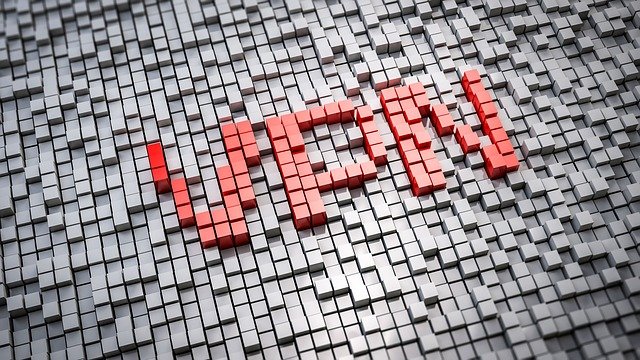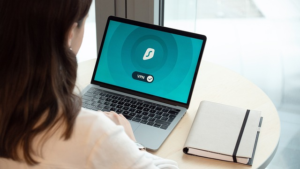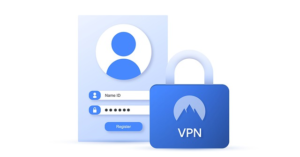
With cyber crime on the rise in Australia and overseas, it is little wonder that the VPN market is booming. A recent report found that the VPN, or virtual private network, industry is expected to grow to $US77 billion by 2026, and new companies are sprouting up to take advantage of the demand.
As our waking hours are increasingly spent online, privacy is paramount. But before you panic purchase the first VPN you find, it’s important to know what a VPN really is, what it does and how it works.
We’ll also cover the key features to look for when you’re ready to buy.
What Is a VPN?
VPNs are virtual private networks that encrypt your data and mask your online behavior from snooping third parties.
When you go to a website, your computer connects to the server where the site is hosted, and that website can see a certain amount of data about you and your computer depending on the site. With a VPN, you connect to a private server first, which scrambles your data and makes it far more difficult for third parties to track what you’re doing online.
All told, secure browsing is the main use for consumer VPNs. However, you can also use a VPN as a small business owner to provide remote access to your business network, and you can even set up a VPN at home, allowing you to access computers and files on your local network from a remote location.
Regardless of the purpose, a VPN forwards your internet traffic to a private network. For private use, that means accessing files without risking them on the internet. For public use, that means connecting to a private network of secure servers before launching into the open internet.
What Can a VPN Do?
A VPN can do a lot of things, and that’s because it changes your IP address. Every computer has a unique IP address when they’re connected to the internet, which tells other computers where in the world you’re located. With a VPN, you connect to another computer (a server) before heading to the internet, effectively telling other computers that you’re in a different location. With most VPN services, you can actually choose this falsified location yourself.
With a new IP address, there are a ton of possibilities. Streaming platforms like Netflix, for example, have different content for different parts of the world. A VPN changes your digital location, allowing you to access the streaming libraries of other countries.
At the extreme end, a VPN helps bypass censorship. Some government agencies around the world use geo-blocking, which is a technique for region-locking content based on your IP address to block websites and services. VPNs get around the issue by changing your IP address and making it seem like you’re connected to the internet from a different location.
On the flip side, VPNs remove accountability, so some people use them for torrenting (aka peer-to-peer file sharing) copyrighted content and engaging in other illegal activities online.
Here’s a quick rundown of some of the things you can do with a VPN:
- Unblock streaming platforms: Some streaming platforms are only available in certain locations, and most have different libraries for different regions. A VPN lets you unblock streaming platforms and browse content from around the world.
- Bypass censorship: Some governments block access to certain websites and services for their residents. A VPN changes your virtual location, allowing you to bypass censorship and see content available in other parts of the world.
- Stop online tracking: VPN services provide an encrypted tunnel, which blocks your internet service provider and websites from tracking data like your IP address, geographical location and browser metadata.
- Torrenting: Torrenting isn’t necessarily illegal, as you can use it to send public domain and personal content. But downloading copyrighted content through torrents is illegal in most countries. It’s still illegal to torrent this type of content with a VPN, but you can use one to hide your identity.
- Access private networks: You can use a VPN to remotely connect to a private network. Although you still use the internet, a VPN provides a barrier between a private network and the open web.
How VPNs Protect Your Privacy (And How They Don’t)
A key part of a VPN is encryption. We’ll talk more about encryption in the next section, but for now, all you need to know is that encryption scrambles your data, which you can only decrypt with the proper key. Basically, it’s a dead-bolt lock for your data door.
All of your data flows through the encrypted tunnel before going to the internet, and no one else can see that data. That allows you to hide metadata that your browser automatically sends when you connect to a website. Browsers carry a lot of data, including your time zone, content language, operating system and even your screen resolution (you can view a full list of data your browser stores on AmIUnique).
Although none of this data directly identifies you, the entire collection is likely unique to you and can be used to identify you through a process known as browser fingerprinting. Government agencies, advertisers and hackers can use this information against you.
A VPN hides all of your browser metadata, as well as your browsing history. While you’re connected, no one, including your internet service provider, can tell what you’re doing online.
A VPN isn’t a one-stop shop for online privacy, though. Anything you do while connected to the internet is fair game, including websites you log into and services you use. Many browsers use an account to transfer information like your browsing history and cookies across devices. This data isn’t protected by your VPN tunnel, either.
How Do VPNs Work?
You can think of a VPN as an added level of security for your internet connection. As mentioned, you connect to a private VPN server before heading out to the open internet, which allows you to change your IP address and appear as if you’re connecting from a different location. VPN providers use strong encryption on that initial connection, though, adding an extra layer of your security.
VPN providers are able to do all of this through VPN protocols. A VPN protocol is essentially a set of instructions that tells your computer how to communicate with a VPN server. In addition to instructions for establishing and maintaining your connection, the protocol includes standards for encryption.
VPN Encryption: A Primer
A big reason to use a VPN is encryption. The vast majority of online browsing is encrypted in one form or another already. The problem is that your encrypted connection still passes along personal information.
Think of your internet connection as a tunnel. This tunnel is wrapped in a layer of encryption that keeps others from seeing what you’re doing online. If you’re logging in to your Twitter account, for example, you’re passing your account information from your computer to Twitter through a tunnel that no one else has access to.
The same thing happens with a VPN. The difference is that you pass your data along to a VPN server, where it’s anonymised, before going to the internet. Most VPN providers use the AES cipher with a 256-bit key. AES is an industry-standard block cipher, which breaks up data into blocks and encrypts them.
Your computer and the VPN server exchange information to establish an encrypted connection, basically verifying that you are connecting to the server you intend to. After that, your data and browsing history are protected from anyone outside the tunnel, and that data doesn’t travel past the VPN server.
In short, a VPN provides an encrypted tunnel, protecting your data while it’s traveling to and from the VPN server. Beyond the VPN server, no one can see who you are or what you’re doing online.
Do VPNs Actually Work?
There’s a bit of a secret sauce when it comes to VPN’s effectiveness. As long as you stick with a reputable VPN service like NordVPN or TorGuard—individual product reviews are a must—your VPN will work.
It’s not surprising that some people aren’t convinced, though. Facebook, for example, offered to pay mobile users $US20 per month to connect to a VPN. According to an investigation by TechCrunch, this VPN — sometimes referred to as Project Atlas — was actually a data siphoning operation that gave Facebook root access to mobile devices.
There are also free VPNs like Hola, which offered a free VPN service that was connected to the Luminati network. Subscribers to this network paid each month to steal bandwidth from the devices using Hola’s free VPN service, essentially creating a botnet with unwitting users’ hardware.
If you connect to a VPN, there’s a quick test you can do to see if it’s working. Ipleak.org and ipleak.net offer free tools for verifying your IP address, DNS requests and WebRTC information (basically, everything a VPN covers up). Connect to your VPN, run the tests on one or both sites and verify that the information is different. As long as it is, your VPN is working as it should.
What to Look For in an Australian VPN
Now that you know what a VPN is, it’s time to choose one. The best VPN services fire on all cylinders, offering security, privacy, ease of use and a vast selection of servers. Here are a few things you should look for when choosing a VPN:
- No-logging policy: VPNs offer an encrypted channel for your data, but that doesn’t mean the VPN itself can’t log your personal information. Consider what Facebook did with Project Atlas. Many leading VPNs have a no-logging policy, which means it can’t keep your personal information on record. Many services even have independent audit certifications for no-logging.
- Wide server selection: Most leading VPNs have thousands of servers, and you’ll never use them all. However, VPN servers are constantly blacklisted. Generally speaking, the more servers you have access to, the better. Also, more servers around the world means you have more options when it comes to your virtual location.
- Top-notch security: Don’t settle for anything less than AES-256 encryption. Most leading VPN services use the OpenVPN protocol on desktop and the IKEv2 protocol on mobile. If the VPN you’re looking at only uses PPTP or L2TP, look somewhere else.
- Streaming performance: Most streaming platforms have some sort of VPN block in place, so it’s important to look at streaming performance before making your choice. Individual VPN reviews here are a must, as nearly all VPNs claim to unblock every streaming platform. Spoiler: not all of them do.
- Speed: Unless you’re under ISP throttling, a VPN will slow down your internet connection. However, some VPN services slow down your speed more than others. Again, individual product reviews here are important.
Above all, though, it’s important to choose a VPN service with a good reputation. As long as you’ve done your due diligence, you can get a VPN that will protect your privacy online.
Frequently Asked Questions About VPNs
Are VPNs legal in Australia?
VPNs are legal in most countries, including Australia. Some countries, however, are more strict when it comes to VPN users and accessibility, so it’s best to consult the laws in your region. Regardless, doing anything illegal while connected to a VPN is still considered a breach of law.
Can I be tracked while using a VPN?
Contrary to what some people may tell you, you can be tracked while using a VPN. Google, for example, can still track what you’re doing online if you’re signed into the Chrome browser. VPNs stop external sources from tracking you, but they don’t stop all tracking. Australian Police can also obtain a court order to access connection logs from your ISP (Internet Service Provider) if they have reason to do so.
How much do VPNs cost?
VPN pricing can be confusing. For most personal VPNs, the standard subscription plan is charged annually (yet displayed as a monthly price). For a reputable service, you can expect to pay between $2-$10 per month depending on speed, customer service, and security.
Source: https://www.forbes.com/advisor/au/broadband/what-is-a-vpn-and-how-does-it-work/


